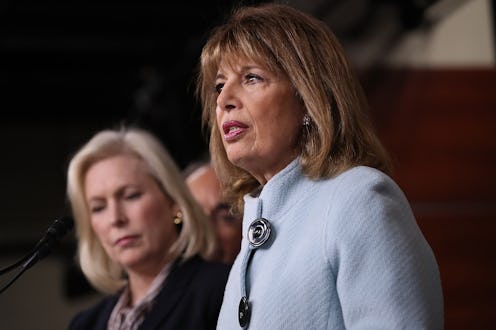
America's reckoning with sexual harassment may have begun with initial reports from Hollywood, but the national discussion isn't limited to the entertainment industry alone. Women in politics, too, have taken this watershed moment to address the purportedly widespread issue of sexual misconduct on Capitol Hill. Now, women lawmakers are tackling sexual harassment in a variety of ways, including participation in hashtag campaigns, introducing bipartisan bills to combat sexual misconduct, or simply shedding light on the oft-neglected and underreported subject.
In reports on the sexual harassment reportedly taking place in Congress, it becomes clear that the present process for reporting an incident of inappropriate sexual behavior is remarkably laborious. Under the current process executed by The Office of Compliance, it can take at least three months for a complaint to be successfully lodged.
As it stands, the federal law mandates that a congressional victim of sexual misconduct report his or her incident within 180 days of the occurrence to the Office of Compliance. Only congressional staffers can file a complaint while non-members like fellows and interns cannot. Once a congressional staffer has followed this stipulated rule, they have to agree to 30 days of counseling and 30 days of mediation. The mediation period has to be successful before the victim can go to the Federal District Court with a complaint.
California Democrat Rep. Jackie Speier called the Office of Compliance's process "toothless" as it "is not a victim-friendly process" but "an institution-protection process" which "encumbers the victim in ways that are indefensible." With such a tedious federal method standing in the way of victims, it's no surprise that many don't report abuse. But that could change. Here are some of the ways women lawmakers' participation is bringing more awareness to sexual harassment in the world of politics.
1. ME TOO Congress Act
The Member and Employee Training and Oversight On (ME TOO) Congress Act was inspired by the the social media campaign #MeToo. The ME TOO Congress Act is a bipartisan bill, led by Rep. Jackie Speier and Sen. Kirsten Gillibrand, which aims to simplify and streamline the previously mentioned Office of Compliance complaint system for victims of sexual assault and sexual harassment.
2. Sexual Harassment Training For House Members
Another bipartisan bill, co-sponsored by Minnesota Sen. Amy Klobuchar, mandates sexual harassment training for House members. "Everyone deserves to feel safe and comfortable at work, and the passage of this official Senate policy is an important measure to ensure that’s the case in these halls," Klobuchar said. Co-signing the effort, House Speaker Paul Ryan announced compulsory training for all members of the House Representatives on Wednesday.
3. Sexual Harassment Training For Senate Members
A similar resolution against sexual harassment was brought up in the Senate. Rep. Klobuchar called it a "first step" toward addressing sexual misconduct but she added that it wasn't robust enough and would need more strengthening to help victims. "This was something we could accomplish immediately and I thought that was important. Next we are turning to the reporting piece of this," she said.
4. Sharing #MeTooCongress On Social Media
In October, Rep. Speier started a #MeTooCongress hashtag campaign hoping that her "colleagues and current/former staff who feel safe to do so, will join me." Detailing an incident from years ago, Speier accused a Chief of Staff of sexually assaulting her but she did not specify any name. With the #MeTooCongress campaign, Speier said she wanted to encourage others to come forward with their stories to overhaul the Office of Compliance's system.
5. Rep. Barbara Comstock Highlights Sexual Misconduct By Male Lawmakers
Virginia Republican Rep. Barbara Comstock shed light on sexual harassment on Capitol Hill during a hearing on Tuesday. Without naming names, Comstock detailed the story of a female aide who accused a male member of Congress of exposing himself to her. "She left, she found another job," Comstock said. "But that kind of situation - what are we doing here for women right now who are dealing with somebody like that?"
6. Over 140 Women In State of California Sign Anti-Sexual Misconduct Letter
Over 140 women signed an open letter on the culture of sexual abuse in California politics. Among those co-signing the message were women lawmakers from both Democrat and Republican parties. Sexual abuse is the norm in California politics, according the signatories. "No matter a woman's age, weight, religion, sexual orientation, race, social status, or position of power, she is not insulated from this behavior. It is pervasive."
7. Former Rep. Mary Bono Speaks Up About Sexual Harassment From Colleague
Former California Republican Rep. Mary Bono spoke up about her experience with sexual harassment as a woman in politics, and said that her initial silence was "part of the problem on the Hill."
8. Sen. Kirsten Gillibrand Calls For Overhauling Federal System of Complaints
Rep. Gillibrand called for overhauling the Office of Compliance's system of complaints and told The New York Times that the "archaic and, frankly, bizarre rules" were "confusing" to many staffers who don't know how to navigate the bureaucratic terrain.
9. New Hampshire Rep. Annie Kuster On Creating A System Of Support For Victims
If the current system seems to be flawed, a new method could help victims with coming forward with their complaints. House Representative Annie Kuster spoke about such a possibility in an interview with New Hampshire Public Radio and said the new system would be "much more accountable, much more transparent and will provide the option of anonymous reporting for purposes of getting access to treatment and recovery services including counseling." The future system would also open its arms to interns and fellows who, under the current system, can't voice their grievances to the Office of Compliance.
With these examples in mind, it's clear that when it comes to sexual harassment, some women lawmakers are putting their party alliances aside and working in unison to end sexual misconduct on Capitol Hill.